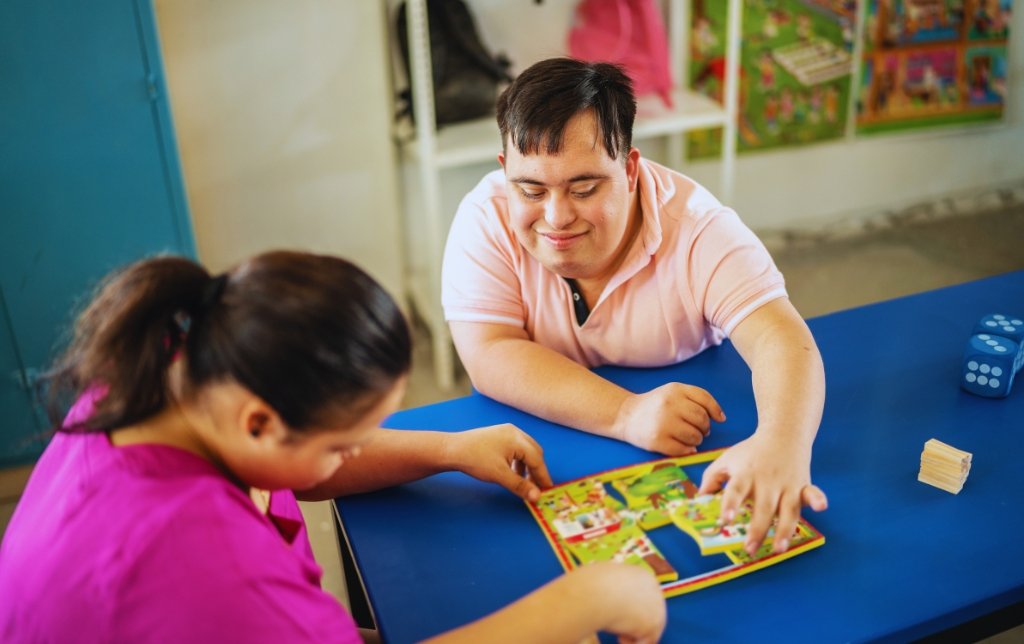No products in the cart.
Teaching assistants help children learn and feel included. They also make sure the classroom runs well. If you enjoy helping children, you may ask, What do you need to be a teaching assistant? The answer is simple. With the right steps, you can start this rewarding job.
First, check your basic skills. You usually need GCSEs or Functional Skills in English and Maths. Then, apply for a DBS check so schools know you can work safely with children. Next, pick a course — Level 2 or Level 3 is best for beginners. You can also try a Level 3 apprenticeship if you want to work and study at the same time. After that, get school experience through volunteering or placements. This helps you learn real skills and feel ready to apply for jobs at local schools or Multi Academy Trusts (MATs).
In this article, we look at what you need to become a teaching assistant in the UK. You will learn each step clearly — from checking your basic qualifications to getting a DBS check, picking the right course, and getting school experience. By the end, you will know how to start your journey and build a job that helps children learn and grow.
What Is a Teaching Assistant and What Do They Actually Do?
A teaching assistant, or TA, works with the teacher to help children learn. They give support in class so every child understands the lesson. Sometimes they help small groups, and sometimes they work one-to-one with a child who needs extra help.
Here are some of the main things a teaching assistant does:
- Help children during lessons.
- Support small groups or one-to-one learning.
- Remind children to behave well and stay focused.
- Prepare learning materials and set up activities.
- Do small admin jobs to help the teacher.
- Make sure children are safe and happy.
- Share quick feedback with the teacher after lessons.
It’s a busy job, but it feels good to help children learn, grow, and feel confident every day.
Do You Need Qualifications to Be a Teaching Assistant?
There isn’t a special licence or national rule to become a teaching assistant. That’s good news — it means you can start your journey quite easily. Most schools just want to see that you have good reading, writing, and maths skills.
However, having the right qualification can really help you stand out. Many schools look for a Level 2 or Level 3 Supporting Teaching and Learning certificate. You can also take the Level 3 Teaching Assistant apprenticeship if you want to learn while you work.
These courses teach you how to support children in class, understand their needs, and help the teacher every day. So, while it’s not a strict rule, getting a qualification is a great way to show your skills and passion for the job.
Is Experience Required for Your First TA Role?
Experience can help, but it’s not always needed for your first teaching assistant job. Many people start with no school background at all. What matters most is your interest in helping children learn and grow.
Still, a bit of hands-on practice makes a big difference. You could volunteer or observe in a local school, nursery, or youth group. This helps you understand how classrooms work and gives you the chance to build confidence. It also helps you meet teachers who can become your referees when you start applying for jobs.
So, even if you’re just starting, try to get a little experience. Every hour you spend around children helps you learn something new and brings you one step closer to your first TA role.
Do You Need GCSEs in English and Maths?

Yes, most schools ask for GCSEs in English and Maths at grade 4 (C) or higher. These subjects help you support children with reading, writing, and numbers. You use these skills every day as a teaching assistant.
If you don’t have these, don’t worry. You can take Functional Skills Level 2 instead. It’s equal to GCSEs and is a great way to meet the requirement.
Here’s what you can do:
- Check if you already have GCSEs in English and Maths.
- Gather your certificates and keep them safe.
- If you don’t have them, book a Functional Skills Level 2 course.
- Finish the course to reach the same level as GCSEs.
Taking this step helps you feel ready and confident when applying for courses or TA jobs.
Do You Need a DBS Check to Work in a School?
Yes, you do. Every teaching assistant needs a DBS check before starting work in a school. It helps keep children safe and shows that you are trusted to work with them. Most schools ask for an enhanced DBS check with a children’s barred-list check.
When you apply, you’ll also need to show a few documents. These include:
- Your right-to-work ID (like a passport or birth certificate).
- Proof of your address (like a bill or bank statement).
- Two references from people who know you well.
Once you start your job, you’ll also take part in safeguarding training. This helps you learn how to protect children and spot any signs of harm. It’s an important step that helps you feel prepared and confident when working in a school.
Which Teaching Assistant Courses Help You Get Hired (Level 2, Level 3, SEN)?
If you want to work in a school, the right course can really help. There are good options for beginners and for those who want to learn more.
The Level 2 Supporting Teaching and Learning (STL) course is great for people just starting out. It teaches you how to help in class, support children, and work with teachers. The Level 3 Supporting Teaching and Learning course or the Level 3 Teaching Assistant apprenticeship gives you more skills. You learn to lead small group work and support children with special needs. With the apprenticeship, you can even earn while you learn.
You can also take short CPD courses to make your CV stronger, such as:
- Safeguarding Children
- Autism and ADHD Awareness
- Phonics and Reading Help
- Behaviour Support
- Paediatric First Aid (good for early years)
Each of these short courses helps you learn useful skills. With the right training, you will feel ready and confident to start your teaching assistant job.
Can You Train as a Teaching Assistant Online and From Home?
Yes, you can. Many Level 2 and Level 3 teaching assistant courses let you study online from home. This is great if you have a busy life, a family, or other work. You can learn in your own time and get help from a tutor whenever you need it.
In these courses, you study the theory part online. You read lessons, watch videos, and do small tasks or quizzes. Your tutor checks your work and gives you feedback to help you improve. But you also need some real classroom experience. You can do this through a school placement, volunteering, or a job in a school. An assessor will visit and watch you work with children to see what you have learned.
Learning online gives you freedom and comfort, while a school experience helps you gain real skills. Together, they prepare you well for your first job as a teaching assistant.
What Personal Skills Do Schools Really Look For in a TA?

Schools want teaching assistants who are kind, patient, and ready to help children learn. Courses are important, but your personal skills matter just as much. These show that you can work well with both children and teachers.
Here are some of the main skills schools look for:
- Good communication: Speak clearly and listen carefully to children and teachers.
- Patience: Some children take longer to learn, so staying calm helps them feel safe.
- Teamwork: You will work with teachers and other staff, so being friendly and helpful is key.
- SEND awareness: Knowing how to support children with special needs shows you care.
- Behaviour support: Use kind and simple ways to guide children and keep lessons calm.
- Basic ICT skills: Be able to use a computer or tablet for school work.
- Confidentiality and safeguarding: Always keep children’s information private and make sure they are safe.
If you have worked in customer service, care, or sports coaching, you already have many of these skills. When you apply, share your examples — they show that you can listen, support, and care for others. Schools love to see that.
How Long Does It Take to Get Job-Ready as a TA?
The time it takes to become a teaching assistant can be different for everyone. It depends on the type of course you choose, how much time you can study, and whether you are already working in a school. The good news is, there’s a path for every learner. If you start with a short beginner course, you can finish it in just a few weeks. These courses help you learn the basics of classroom support and build confidence.
A Level 2 or Level 3 Teaching Assistant course usually takes 3 to 9 months. The time depends on how fast you study and how your training provider sets the lessons. These courses go deeper and teach you how to support pupils, help teachers, and understand learning needs. If you pick a Level 3 apprenticeship, it often takes 12 to 18 months. This is because you’ll be working and studying at the same time. You’ll get paid, gain real experience, and learn the skills schools look for.
Some schools may even hire you before you finish training if they see that you’re kind, reliable, and good with children. So, stay motivated and take one step at a time — every bit of learning brings you closer to your first teaching assistant job.
Can You Start as a Volunteer or Helper First?
Yes, you can — and it’s a great way to start! Many teaching assistants begin as volunteers or classroom helpers. It’s a simple and friendly way to learn what school life is really like and to build confidence in children. You can email local schools or Multi Academy Trusts (MATs) with a short CV. Tell them who you are, why you want to help, and when you’re free. You could offer to help with:
- Reading groups
- Lunchtime or breakfast clubs
- Classroom support during lessons
Try to go in on regular days so the staff and children get to know you. Keep a record of your hours and what you do. Later, you can ask the school for a reference to use when you apply for a paid job. Volunteering shows schools that you care about children and want to learn. It’s a kind and smart first step toward becoming a teaching assistant.
Can You Be a Teaching Assistant Without a Degree?
Yes, you can. You don’t need a degree to become a teaching assistant. Many people start this job with the right skills, some training, and a love for helping children learn. That’s what really matters. Most schools look for GCSEs or Functional Skills in English and Maths, a DBS check, and a Level 2 or Level 3 Teaching Assistant qualification. You can also take an apprenticeship if you want to earn while you learn. It also helps to get some volunteer experience in a school. Spending time in a classroom shows that you care and are ready to learn on the job.
So, don’t worry if you don’t have a degree. With the right attitude, a bit of training, and some hands-on experience, you can build a rewarding career as a teaching assistant.
What Happens After You Become a TA (Pay, Hours, Term-Time Work)?
After you become a teaching assistant, you start to see how school life really works. Most TA jobs follow the local council pay scale (called NJC grades). Your pay depends on your level, experience, and the area where you work. Many TAs work term-time only, so you have school holidays off. Because of this, your pay is pro-rata — you are paid for the weeks you work, but the money is spread over 12 months. This means you still get paid every month, even during holidays.
When reading job adverts, always check:
- The spinal point (SCP) or pay grade is listed.
- The hours and weeks you will work.
- Any extra pay, like London weighting or an SEN allowance for helping children with special needs.
It’s a busy job, but it comes with steady hours, long holidays, and the joy of helping children learn and grow.
Final Thoughts: Are You Ready to Start Your Teaching Assistant Journey?
Becoming a teaching assistant is a wonderful way to make a real difference in children’s lives. You don’t need a degree — just patience, kindness, and the right training. Every small step you take, from getting your DBS check to gaining school experience, brings you closer to a rewarding job where you help pupils shine every day. If you’re ready to take your next step, check out the course at Open Learning Academy: Teaching Assistant.
This course is great for anyone who already works as a teaching assistant and wants to move into a full teaching role. It guides you through each part of the journey—what you’ll need, how to prepare and how to leap smoothly.
FAQs
Can you be a TA with no experience?
Yes, you can be a teaching assistant with no experience. But having some volunteer time in a school really helps.
How much is a TA qualification?
The Level 2 Teaching Assistant course costs only £19, down from £229.99 — an amazing 87% discount.
Can I do a teaching assistant course for free?
You may get the course free if you live in London and have not studied it before.
How do I become a teaching assistant with no experience?
You can become a teaching assistant with no experience. Try volunteering or starting in a simple school support job.
Is a TA job stressful?
A teaching assistant job can be stressful at times. The work can be busy, and helping with behaviour or special needs can be hard.




